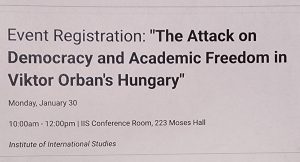
Social media is not fully democratic, as the largest platforms are in the hands of a few owners, the Israeli political influencer argued.Continue reading
During a panel discussion organized by the University of California, Berkeley’s Institute of International Studies, John H. Shattuck, former President of the Central European University has been involved in an unprecedented attack against the Hungarian government of Viktor Orbán, making parallels between fascism and the current administration in Budapest. Another speaker, Éva Fodor, also a lecturer at the CEU, has alleged that Viktor Orbán defines Hungarian identity on “whiteness”.

During the 90 minute discussion entitled “The Attack on Democracy and Academic Freedom in Viktor Orbán’s Hungary”, the former and current CEU staff have presented a long list grievances that they feel are proof of erosion of democratic principles in Hungary. Although the moderators from Berkeley have assured the audience of a well balanced discussion in terms of the pluralism of opinions, they have both confessed to be “liberals”, and no conservative speakers have been invited to take part either.

(L-R) Third CEU President and Rector Yehuda Elkana, founder George Soros and fourth President and Rector John Shattuck. Photo: Twitter CEU
One of the Berkeley University moderators, who had just earlier assured the audience of a balanced and impartial presentation, had set the tone for the discussion by saying that the topic is, “I hate to say it, Viktor Orbán’s Hungary”. The former president and rector at the US billionaire oligarch, George Soros-financed university, CEU, John H. Shattuck had picked up this line of thought by saying that Viktor Orbán took the conflict between liberal democracy and nationalism and used it to turn Hungary into an authoritarian state, particularly so when it comes to academic freedoms. He continued by comparing this alleged move to the spread of what he called an “anti-democracy disease”.
The CEU leader has also attempted to explained the success of national conservatives with the electorate through what he believes to be Hungarians’ “deep seated victim mentality”, gained over many centuries of oppression.
Shuttock alleged that Orbán had limited the powers of judiciary by packing it with his own people and forcing some judges to retire, but in his speech he mainly focused on alleged violations of academic freedoms. In his view, the Hungarian PM is working actively to prevent intellectual pluralism that is the essence of academic freedom. He also alleged that the government took over national universities by cutting their funding and censoring their curricula while putting them under foundations controlled by the government. To one of the moderators’ counter-argument that intellectual pluralism is also under threat in American universities, where conservative lecturers have been almost entirely silenced, Shuttock reacted evasively.
Perhaps unsurprisingly, the former Soros-funded University head had complained about Viktor Orbán’s alleged attempt to control the CEU by preventing it from issuing American degrees. The dispute goes back to 2017, when the government had barred the CEU from issuing US diplomas while not having a campus in the US, because this had seriously disadvantaged the competitiveness of other Hungarian universities. In October 2017 Soros’ university had made an agreement with the US based Bard College concerning accreditation, but the Hungarian government had deemed it a mere loophole and a bogus retroactive move, finally rejecting the solution. This prompted the CEU leadership to move some of its courses to Vienna, Austria.
Shuttock continued his presentation by calling Viktor Orbán’s “soft authoritarian”, claiming that his power comes not from violence, but repression.
According to him, the prime minister targets his opponents with oppressive regulation and threats. In the former CEU leader’s view, his model is different from fascism, but it has elements of that,
because it uses populist fear by using elements of racist and antisemitic propaganda. However, the only example that Shuttock was able to support this extreme characterization with was a vague reference to the conflict between the CEU’s founder George Soros, and Viktor Orbán. In Shuttock’s view this is because Orbán allegedly attacked Soros with antisemitic slogans, although a thorough search on the subject did not result in any such statements originating from the Hungarian prime minister.
In a further escalation of disparaging remarks on account of Hungarians, Shuttock also claimed that Hungary has a history of long authoritarian control and no experience with democracy. This despite the fact that Hungarian history is a near continuous struggle for freedom ever since the times of the Mongol invasion in the 13th century, with centuries of tradition of parliamentarianism. Shuttock’s remarks can thus only be interpreted as explaining the current Hungarian political status quo with an electorate inexperienced in democratic standards, rather than an insistence on civic values, and a conservative political outlook.
The other speaker, Hungarian-born gender studies lecturer Éva Fodor claimed that current Hungary is an example how democracy can be dismantled and eliminated in a country in a short period of time. In her view, foundation universities are an absolute elimination of universities autonomy because board members are appointed by the government, and only government loyalist can serve in them. In fact there are currently 38 universities in Hungary, only 21 of them are run by foundations and only in 10 of these can one find active politicians among the board of governors. Moreover, the inclusion of active politicians on boards of governorns is a fairly standard phenomenon at Western, especially in German universities.

Gender studies lecturer, Éva Fodor. Facebook CEU
Fodor had also made some strong accusations against one of these institutions, the Mathias Corvinus Collegium (MCC), where she alleged that students are selected from government sympathizers. According to her, MCC is subservient to the government’s ideology, and in return it receives as much as 1% of Hungary’s GDP in endowments, more than Oxford University does. These data are fairly misleading though as MCC gets most of its funding through asset management, that is, managing shares in state-owned energy (MOL) and pharmaceutical (Richter) enterprises, where the annual dividends come nowhere near Oxford’s USS 1.3 billion (5 billion with Colleges included) annual endowments.

The University of California, Berkeley. Photo: Hungary Today.
The CEU’s gender studies lecturer went even further by saying that the Orbán government is also trying to gain ideological control over other educational institutions, such as colleges and high schools. As a troubling example of this she had brought up the case of the Eötvös József Gymnasium in Budapest, where in Éva Fodor’s view there is an ongoing smear campaign against its director orchestrated by the government due to the fact that staff and students were actively involved in recent anti-government protests. In reality though, Fodor had forgotten to mention that the director of the high-school was reportedly recorded admitting to taking bribes for years in return for admission of students with lesser marks. The police have launched an investigation into the allegations. Why Fodor thinks that it is inappropriate for the media to report on a corruption scandal is unclear, especially given the fact that her own children are currently students at the scandal-hit institution, as she herself had admitted during her presentation.
Fodor also took an issue with plans to launch a campus of the Chinese Fudan University in Budapest, which she alleges to be a result of the fact, that it is an institution that “does not ask questions” about academic freedoms, in contrast to the CEU, which does. Drawing from the observations of the Hungary Today team, which has visited Berkeley only two days prior to the above discussion in order to engage with students’ organizations, one of the largest student groups at the venerable US institution was made up of Chinese-American students and of Chinese nationals. In fact, a significant number of leading Western universities could not balance their books today at all without the contribution of Chinese government sponsored students and research.

The University of California, Berkeley. Photo: Hungary Today.
Apart from her highly critical views on the government, Fodor held similarly disparaging views about the Hungarian populus as well .
In her view, Viktor Orbán is using antisemitic discourse against Soros to win elections, implying that the majority of Hungarians would find such rhetoric attractive, and voters would endorse antisemitism. In truth antisemitism has very little place in the Hungarian public discourse. When it does pop its head up, it usually does so from the ranks of opposition politicians, such as Krisztina Baranyi of the joint opposition of socialists and liberals, or in the ranks of the far-right Jobbik.
Among other things Fodor had also accused the Hungarian prime minister of an anti-intellectual agenda that in her view would play well with his alleged voting segment in the countryside. She had also claimed that people in the countryside tend to vote Orbán because they only have access to what the government wants them to know. In the age of ubiquitous internet access though this argument seems fairly indefensible.
Yet this assertion has formed Fodor’s anti-countryside narrative that culminated in her claiming that “of course there was a lot of cheating in the countryside” (during the elections), but even if there was not, Viktor Orbán would be still win.
She did not provide any proof or description for what she meant by “cheating”, nor did the EU electoral observers spoke of such incidents in their report about the parliamentary elections of April 2022.
Similarly baseless was Fodor’s final thought on Hungarian current affairs, in which she claimed that Viktor Orbán had tried to convince Hungarians that they are “superior to everybody”, because they are white, while migrants who try to enter the country are not. In Fodor’s view, this is how the prime minister defines being Hungarian. However, as in her previous statements, a search did not come up with corresponding statements that could be attributed to Viktor Orbán on the subject-matter.
Featured Photo: Facebook CEU